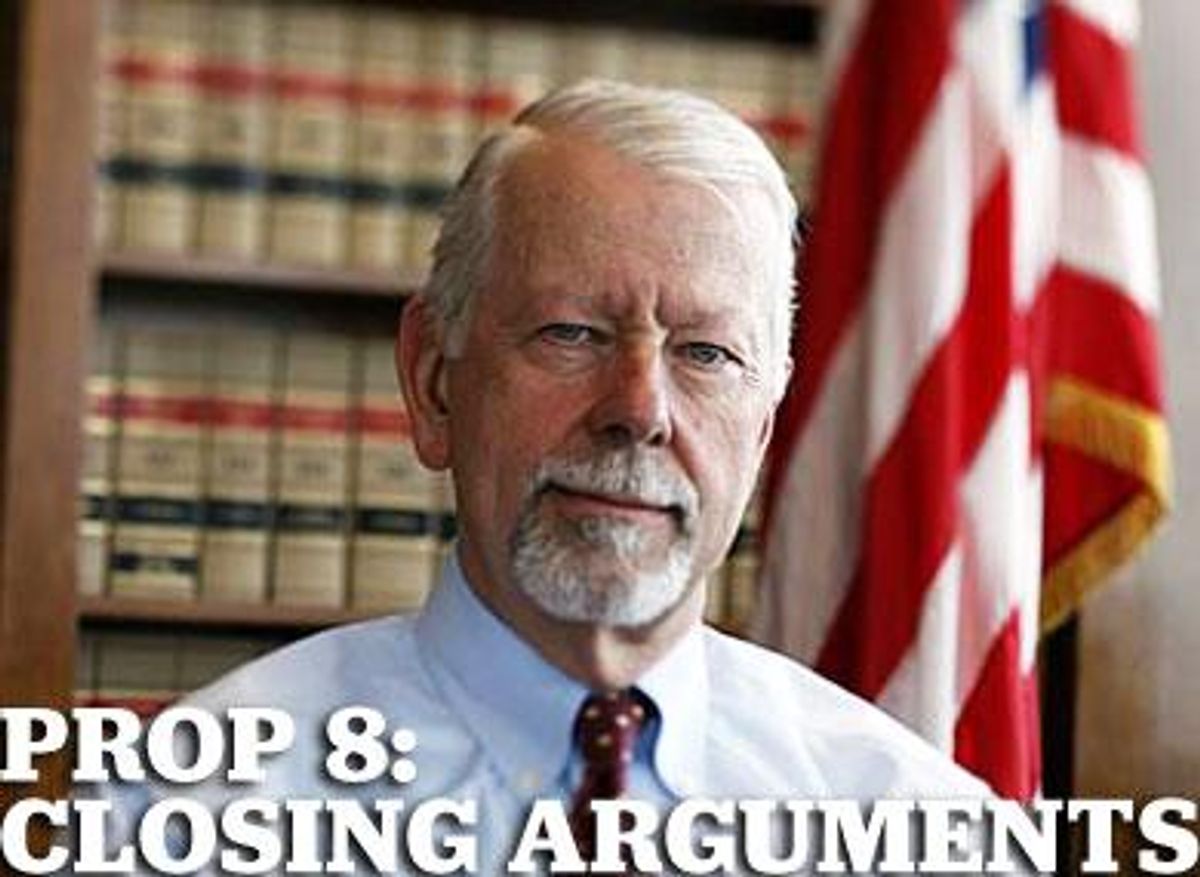Upon taking the bench before a packed San Francisco federal courtroom on Wednesday, U.S. district court judge Vaughn R. Walker said that he wished the Proposition 8 trial would have moved faster than the six months it has taken to arrive at closing arguments.
"But June is, after all, the month for weddings," Walker quipped to courtroom laughter.
Walker did not rule from the bench in the case Wednesday, as some observers earlier this year had predicted he might do, but attorneys for two California gay couples who sued in federal court last year after they were denied marriage licenses passionately argued that the state has no legitimate interest in denying gay men and lesbians the right to marry. Perhaps not surprisingly, they used one defense expert witness's January testimony to bolster the point.
The historic weight of Wednesday's proceedings was easily felt both in and around the courthouse, from an early morning rally outside by gay rights activists, to high-profile attendees on both sides including San Francisco mayor Gavin Newsom and National Organization for Marriage president Maggie Gallagher, to the sheer number of public viewers scrambling for a seat in the overflow courtroom (court officials, overwhelmed by the crowd, had to issue a secret password to anyone needing a bathroom break and afraid of losing their seat upon returning).
Speaking before the court, attorney Theodore B. Olson, who took on the suit along with David Boies, his rival in the 2000 U.S. Supreme Court case
Bush v. Gore, said that antigay forces have argued that gay marriage "is too novel an experiment. That is the essence of their case to the end of the trial: They just don't know whether same-sex marriage will harm the institution of marriage."
Plaintiffs' evidence presented in court, Olson said, proved otherwise: that same-sex couples marrying has no detrimental effect on heterosexuals marrying and raising children, and that the children of gay and lesbian couples fare better when their parents are able to marry. The latter point was made earlier this year under cross-examination by defense expert witness David Blankenhorn, whose testimony Olson referenced repeatedly during his closing arguments.
"We have demonstrated during this trial that [Prop. 8] causes grave, permanent, irreparable, and totally unnecessary harm," Olson said. "We have improved the institution of marriage when we allowed interracial couples to get married. We have improved the institution of marriage when we allowed women to be equal partners in the martial relationship ... And we will improve the institution of marriage ... when we eliminate this terrible stigma."
Walker's wide-ranging questions to Olson during closing arguments included why domestic partnerships are inferior to marriage and whether the case would be different if California had never permitted same-sex marriage in the first place. Olson responded that domestic partnerships were, by definition, separate and unequal, lacking the symbolic import of marriage. He said that if his legal team were to present a similar case in a different state, the arguments would remain the same.
Defense attorney Charles Cooper spent much of his time before the court arguing that limiting marriage to opposite-sex couples was vital to maintaining "responsible procreation" in society. The state, he said, had a vested interest in "channeling" natural human impulses into the formation of enduring relationships suitable for raising children.
Cooper's emphasis on procreation as a fundamental reason to prohibit same-sex couples from marrying was, in fact, ultimately the winning strategy, NOM's Maggie Gallagher asserted. "It's the reason why marriage is that of husband and wife. And every court has upheld the right of the voters to define marriage in this way, as seeing responsible procreation as the primary justification," Gallagher told
The Advocate.Walker also asked Cooper whether the defense believes that the marriages of the approximately 18,000 same-sex couples who wed in California before voters passed Prop. 8 should be invalidated. Cooper replied that he had no issue with the existing marriages, unless they present to the state a constitutional "irreconcilable conflict."
"We have never disputed that gays and lesbians have been victims of a long and shameful history of discrimination," Cooper said. "But the fact of a history of discrimination is not by itself sufficient to warrant heightened judicial scrutiny."
Following court proceedings, defense attorneys denied claims that they had in effect boycotted the trial by presenting a dearth of expert witness testimony supporting their case. "The central overriding question is whether the issue before the court, which was before the people of California, should be decided by [Walker] or whether it should be decided by the people themselves," said Andy Pugno, general counsel for Yes on 8.
Gallagher did not predict a ruling in gay-marriage opponents' favor, regardless of the arguments presented by the defense. "Today, as throughout this trial, Judge Walker has convinced me that he will rule for same-sex marriage, probably on the grounds that it's a fundamental right and that it's gender discrimination subject to heightened scrutiny," she said. NOM is not a party to the litigation, though it is helping to raise money for the defense as the case moves forward, she said.
Appearing at a post-trial press conference with plaintiffs Kris Perry, Sandy Stier, Jeff Zarrillo, and Paul Katami, David Boies congratulated Olson on the day's proceedings, calling his arguments "the best I've heard in 45 years of practice."

